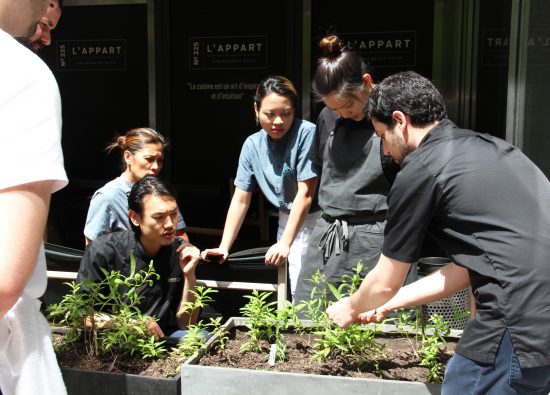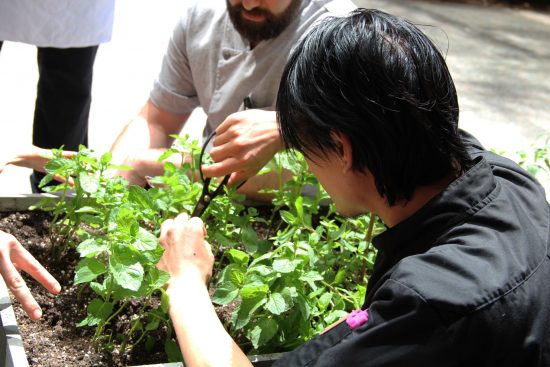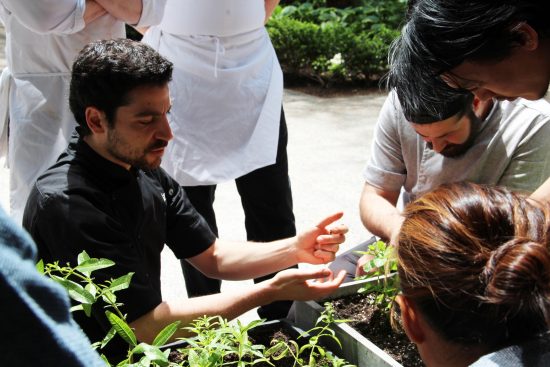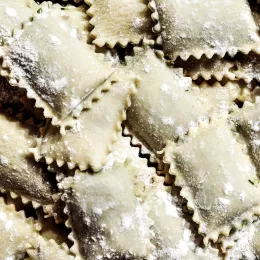Did you know: the hydroponic garden at ICE supplies fresh herbs and produce not just to culinary and pastry students, but also to a growing list of fine dining restaurants in New York City? We caught up with Rob Laing of Farm.One to chat about the herbs and harvesting know-how they’re delivering to L’Appart, the Michelin-starred restaurant located in Brookfield Place led by Executive Chef Nicolas “Nico” Abello.

Tell me about your agreement with L’Appart.
Farm.One is working with L'Appart to plant and help maintain a new outdoor aromatic herb garden on their terrace at Brookfield Place. It's an intimate area where guests can sit outside and enjoy fresh tea infusions using a selection of herbs from the garden after their meal at the restaurant. We had already been supplying ingredients to the restaurant, so being part of their herb garden was the natural next step.
What kind of herbs and produce do you supply them?
For their fresh tea infusions program, L'Appart uses a number of aromatic herbs like lavender, bergamot, lemongrass, thyme, lemon verbena and different varieties of mint and thyme, including pineapple mint, chocolate mint, lemon thyme, rose petal thyme and others. For the restaurant, we supply all kinds of fresh herbs, edible flowers and some microgreens — for example, beautiful wood sorrel flowers, in keeping with their French roots.

What about L’Appart makes them a good recipient for fresh, hydroponic herbs?
We love working with Chef Nico and his team because they share our excitement for being able to grow interesting herbs right here in the city. Their menu is elegant and French, with many opportunities to showcase excellent fresh flavors paired with their other carefully chosen ingredients. But also, they're literally in the same building as us. You can't get more local than that.
Can you explain a bit about the educational aspect of supplying them with herbs? Who do you teach? What do you teach them? Why is this important?
The technique of harvesting from a plant is almost as important as how you plant the seed. If you do it incorrectly, you're often left with a sad-looking stick. So we work with L'Appart to teach their staff how to continually harvest from their herb garden, while encouraging the plants to flourish. If we do this right, they'll have a vibrant garden all through the season for their guests to enjoy.
How does this compare with what ICE students learn in the hydroponic garden?
When students start at ICE, they are often at the beginning of their culinary journey and just getting their first taste of fresh herbs, especially the more unusual ones. This is why the chef instructors at ICE bring their students into the farm early on, to allow students to experience and taste the range of herbs we grow. As they progress through the course, they can build on their knowledge of produce, all the way through to their externships with restaurants like L'Appart, where they get to work with and learn from leaders like Chef Nico — professionals who have a career's worth of experience working with fresh products.

What are some of the dishes that Chef Nico is creating with the hydroponic garden’s herbs?
Chef Nico's recent dishes using our products in a private dining event included:
- King Coho salmon, sorrel and oxalis — It's very common to pair citrus with fish, so it makes sense that this dish brings together the sour/acid notes of different kinds of sorrel and oxalis (which is also commonly called “sorrel”) with the pleasant fattiness/oiliness of salmon, balancing the dish. This dish was made with purple and red oxalis flowers, yellow wood sorrel flowers, plus beautiful red veined sorrel and striking purple oxalis leaves.
- Lobster, lemon balm and anise hyssop — Chef Nico wanted to express the many variations on anise flavors and scents. Micro anise hyssop, bronze fennel fronds and fennel crowns all bring out a slightly different aspect of anise. Lobster and fennel, and fennel and onion are classic pairings. The fried lemon verbena was a cool touch which made the sometimes-chewy herb crispy and delightful.
- Goat cheese, nepitella, wild strawberry — This was an interesting dish by pastry chef Mina. It featured za'atar marjoram, an ingredient not commonly found in a dessert dish. The combo of the burnt toast, the classic mint and goat cheese adapted to the more unusual nepitella, and the wild strawberry sorbet worked really well.
Can you name a few other restaurants you’re currently supplying?
We work with a number of New York's Michelin-awarded restaurants, including Atera, Daniel, Jungsik, Chef's Table and other excellent but more informal destinations like Mission Chinese Food, Double Zero, Pizza Loves Emily (Ed. note: from ICE alum Matt Hyland), Print and Butter.
You, too, can study farm-to-classroom cuisine at ICE — click here for more information on ICE’s career programs.




